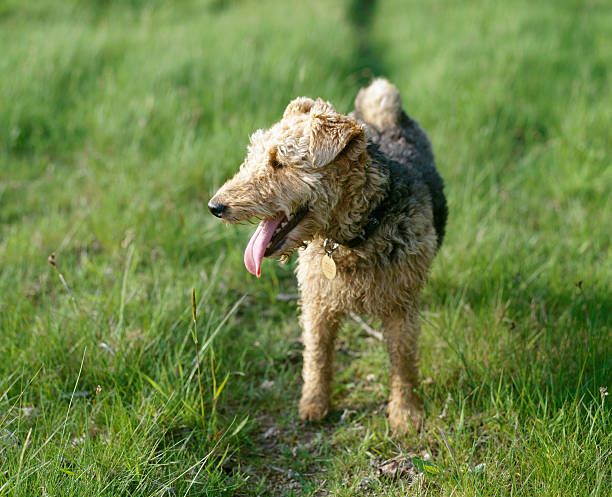Origin History of the Welsh Terrier:
The Welsh Terrier is an ancient breed with a rich history that dates back centuries. Originally known as the Black-and-Tan Wire Haired Terrier or the Old English Terrier, the Welsh Terrier was used by hunters to pursue foxes, otters, and badgers. He was also commonly used to eradicate vermin. This hardy terrier was so well-loved and valued in England that he was finally classified as a Welsh Terrier by the Kennel Club of England in 1885.
The Welsh Terrier began arriving in the United States in 1888, and his popularity steadily grew over the following decades. He was closely associated with Wales, although he was also found in many parts of England during the 19th century. It is believed that the Welsh Terrier may have descended from the Clydesdale Terrier or Paisley Terrier, which was brought to Yorkshire by Scottish workers during the Industrial Revolution. It is also thought that the English Black and Tan Toy Terrier, the Skye Terrier, and the Waterside Terrier may have contributed to the development of the breed.
The Welsh Terrier is a beloved breed with a long and fascinating history. He is still valued as a loyal and hard-working companion, and is a popular breed throughout the world.

Welsh Terrier Appearance:
The Welsh Terrier is a medium-sized breed with a distinct look. He has a square build with a broad head and a square muzzle. His eyes are dark and his ears are V-shaped and drop down to the side of his head. His coat is wiry and weatherproof, usually black and tan in color. He has a thick undercoat to keep him warm in cold weather, which should be stripped several times a year.
The Welshie has a proud and dignified demeanor, with an air of confidence. His gait is light and steady, with a slight bounce in his stride that reflects his playful personality. His tail is usually carried upwards and is often docked to a length of two to three inches. All in all, the Welsh Terrier is a handsome breed with a unique look that sets him apart from other breeds.
Diet and Nutrition:
When it comes to diet and nutrition needs, Welsh Terriers are a moderately sized breed that require a well-balanced diet to maintain their health. As with all dogs, it is important to provide them with quality food that is high in protein and fat, as well as vitamins and minerals. It is also important to avoid foods that are high in sugar, as it can be damaging to their health. It is recommended to feed your Welsh Terrier two meals per day, in the morning and in the evening.
When it comes to treats, it is important to limit them to no more than 10% of their daily caloric intake. Make sure to select treats that are low in fat and sugar, and that contain no artificial flavors or colors. It is also important to make sure that treats are given in moderation and not overfed to avoid weight gain.
Finally, it is important to provide your Welsh Terrier with plenty of fresh, clean water. This will help them stay hydrated and avoid possible health issues associated with dehydration. It is also important to keep your dog’s bowl clean and check it regularly to make sure there is no debris or bacteria in it. Proper nutrition is essential for keeping your Welsh Terrier happy and healthy, so make sure to stick to a well-balanced diet and feed them healthy treats on occasion.

Common Health Issues Affecting Welsh Terriers:
Welsh Terriers are generally a healthy breed, but like all breeds, they can be prone to certain health issues. Some of the health conditions they are more likely to suffer from include hip dysplasia, elbow dysplasia, hypothyroidism, von Willebrand’s disease, and thrombopathia. It is important to be aware of these conditions if you are considering bringing a Welsh Terrier into your home.
When purchasing a Welsh Terrier puppy, it is important to work with a reputable breeder to ensure that both of the puppy’s parents have been tested and cleared of any of these health issues. You can confirm health clearances by checking the Orthopedic Foundation for Animals (OFA) website. It is also important to maintain good care and regular veterinary checkups for your Welsh Terrier to ensure early detection of any potential health issues.
Interesting Facts About Welsh Terriers:
One of the most interesting facts about Welsh Terriers is that they are actually an ancient breed. While their exact origin is unknown, experts believe that the Welsh Terrier is one of the oldest terrier breeds. In fact, their lineage can be traced back to the 1700s. This means that the Welsh Terrier has been around for centuries and has been used for a variety of tasks, including hunting, tracking, and herding.

Another interesting fact about Welsh Terriers is their unique coat. Unlike many other terrier breeds, the Welsh Terrier has a wiry coat that is considered to be self-cleaning. This means that the coat will naturally shed dirt and debris, making it easier to maintain. With proper grooming and care, the Welsh Terrier’s coat will stay healthy and look great for years.
Finally, Welsh Terriers are known for their intelligence and loyalty. They are highly trainable and are eager to please their owners. This fantastic breed makes great family dogs as they love to play and cuddle with their owners. They are also known for their protective nature and make excellent watchdogs. With their intelligence and loyalty, it’s no wonder that Welsh Terriers are so popular.
Where to Adopt or Buy:
Finding a Welsh Terrier to adopt or buy can be a challenge. It’s important to do your research and find a reputable breeder or rescue organization that can provide you with a healthy, well-socialized puppy or adult Welshie. Reputable breeders will be able to answer any questions you have about the breed, and they should be open to allowing you to meet the puppy’s parents. A good rescue organization, like the Welsh Terrier Rescue Service, will also be able to provide you with a healthy, well-socialized Welshie that is already house-trained and ready to join your family.
When it comes to finding a Welsh Terrier, the internet can be a great resource. You can find online databases of breeders and rescue organizations as well as reviews from previous customers. Word of mouth from friends and family is also a great way to find a Welshie. Your local vet or pet store might also have information about breeders and rescues in your area. Finally, you can also check with your local breed clubs and ask for referrals.
No matter where you find your new pup, be sure to do your research and ask lots of questions to ensure that you’re getting a healthy and well-socialized Welshie. It’s also important to make sure that the breeder or rescue organization you’re dealing with is reputable and that they are providing you with all of the necessary information about the puppy or adult Welshie. With the right research and preparation, you can find the perfect Welshie to join your family.

Conclusion:
The Welsh Terrier is an active, loyal, and devoted breed that loves to be part of the family. He is an intelligent and energetic dog that loves to play and loves to be around people. He is friendly and sociable, and is generally good with children and other dogs. He may have a bit of a stubborn streak, so he will need consistent and firm training to ensure he behaves well.
However, with the right training and socialization, the Welshie can become a great family companion. He is loyal, affectionate, and always ready for a good time. He can be independent, but that’s offset by what people love most about him: his zest for life and his happiness. If you’re looking for an active, loving, and devoted companion, the Welsh Terrier may be the perfect fit for you.
FAQ:
Q: What is the temperament of a Welsh Terrier?
A: The Welsh Terrier is a cheerful, intelligent, and affectionate breed. They are loyal and devoted to their family, and are typically quite social and playful. They are not as hot-tempered as some other terrier breeds, so they make great family pets, especially with children. They can be independent, which can sometimes make training difficult, but their loving disposition and energy make them a great choice for any family.
Q: How do I train a Welsh Terrier?
A: Training a Welsh Terrier can be a challenge as they can be quite independent. It is important to use positive reinforcement and consistency when training them, as harsh corrections can quickly shut down any chance of getting through to them. They can also become bored easily, so it is important to have an interesting and varied training routine. Socialization is also an important part of training, as Welsh Terriers can be combative with other dogs and animals. With proper training and socialization, they can get along well with other animals.
Q: How much exercise does a Welsh Terrier need?
A: Welsh Terriers are high energy dogs and need at least 30 to 60 minutes of exercise each day. This can be accomplished by going to the dog park, playing in the yard or house, or going on a long walk. It is important to remember that letting them hang in the yard by themselves is not enough exercise, as they may try to jump the fence.
Q: Does a Welsh Terrier do well in an apartment?
A: Welsh Terriers can live in an apartment, but they can be quite vocal, which can be a problem in buildings with noise restrictions. Ideally, they should have a house with a small, fenced yard. It is also important for them to live indoors with their family, as they are people dogs and not meant to be confined to a crate or kennel.
























